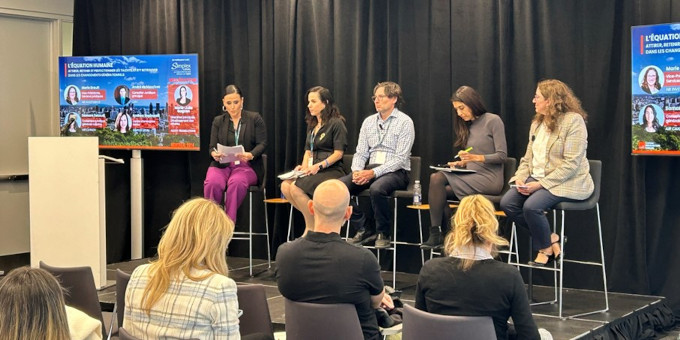
Advice

Attracting, Retaining, and Developing Talent While Navigating Generational Change
- Legal Transformation
- 2 Mins
Andrea Sepinwall, Senior Legal Counsel, Simplex Legal, spoke at the Legal Innovation Forum in Montréal on March 27. Below are her key takeaways.
One of the major challenges legal leaders face today is recruiting and retaining young talent. Recently Andrea Sepinwall of Simplex Legal LLP had the privilege of discussing this and other important topics with an esteemed group of panelists at the Legal Innovation Forum, which included:
- Marie Brault, Vice President, Legal Services, National Bank Investments
- André de Maurivez, Senior Legal Counsel, CIBC\
- Samara Sekouti, Deputy General Counsel – Commercial Affairs, Air Canada
- Andrea Sepinwall, Senior Corporate Counsel, Simplex Legal
- Marie-Julie Gagnon, Senior Director, Business Development, Alexa Translations
The key themes covered in the panel discussion included the emergence of new generations of leaders who are challenging traditional business models, the importance of diversity, equity, and inclusion (DEI), and how organizations are aligning with the generational shift in career growth.
Also examined on the panel was meeting the evolving needs of talent through flexible arrangements and opportunities for alternative legal careers. There was much discussion around the idea of a “career ladder” vs. a “career lattice”. It is often thought that legal careers are linear, with only one vision of success, and that they are constrained in the sense that they are tied to a particular jurisdiction and often to a particular practice area as well. However, there are endless opportunities to push the boundaries of this conventional wisdom: there is the ability to easily switch practice areas without having to start from zero when it is acknowledged that the inherent and real value of what previously acquired expertise and work habits bring. Jurisdictions can be changed thanks to the increased allowance for remote work or even by practicing physically in a new jurisdiction, thanks to more flexible mobility rules. Careers settings can also be changed given the much-expanded choice of environments where a lawyer can work, as between big law, in-house, and ALSP’s to name but a few of the ways that lawyers can diversify their careers.
In addition to the evolving needs of talent, there were several focused discussions. Below is a summary:
The legal industry is evolving, and as a result, so are the business models that support it. Legal employers need to respond to the changing expectations of the next generation. The traditional partner track is no longer the only career path worth pursuing. Today, lawyers have many career paths available to them, and they rarely stick to just one. The younger generation is challenging the status quo, advocating for changes in how lawyers work, and challenging the expectations set for achievement and success. Although there may be initial hesitation to this new approach, it has the potential to save future generations of lawyers from unforgiving and relentless work environments.
The Role of DEI in Recruitment and Retention
As organizations become more agile, they are more intentional about hiring practices and implementing policies that reduce barriers to entry and retention, including implementing technologies that make the practice of and access to legal services more equitable. A study by McKinsey & Company found that companies with racial and ethnic diversity in the top quartile were 35% more likely to earn profits above the industry average. This is because diverse teams are a competitive differentiator from the "alumni club" often seen in many organizations. This change is attractive to clients.
A Fresh Approach to Supporting the Business
Many younger lawyers no longer follow predetermined paths and embrace the transformative power of work-life balance – legal leaders need to listen and be flexible in understanding their values. Legal leaders need to look for opportunities to integrate their legal teams into the broader business to support the development of new skills and perspectives that can benefit the organization. The value that lawyers bring to the table is not limited to expert advice on specific subjects but broader life experience, and an understanding of the pressures facing the business.
There is an evolving landscape of legal services, delivery of legal services, and consumption of legal services – incorporating new ways of working is critical. Integrating flexible legal talent into a law department strategy is a strategic advantage as it enables companies to adjust their legal resources as needed.
---------------------------------------------------------------------------------------------------For more information on how the Canadian legal landscape is evolving to provide legal services to clients, please reach out to our team at emailus@simplexlegal.ca
The views expressed by the quoted individuals in this blog post do not necessarily reflect the opinions or policies of their companies.
The contents of this article are intended to convey general information only and not to provide legal advice or opinions.
